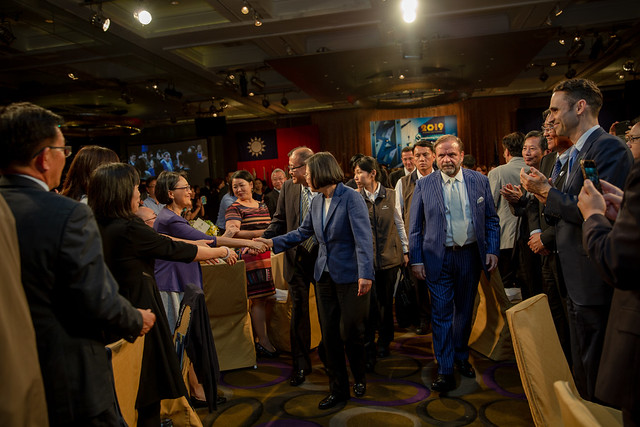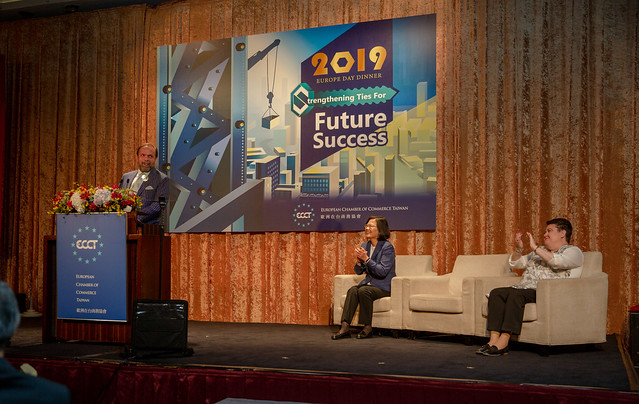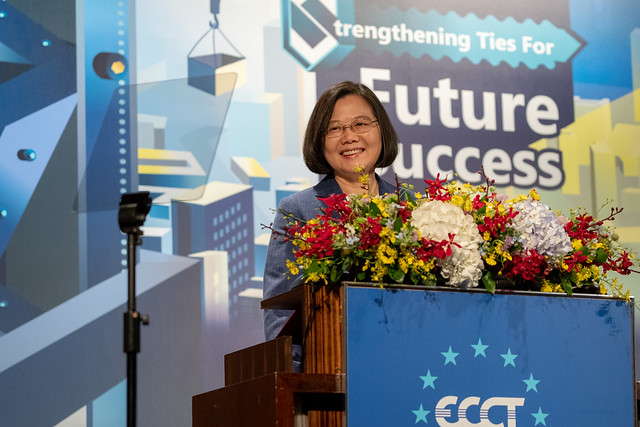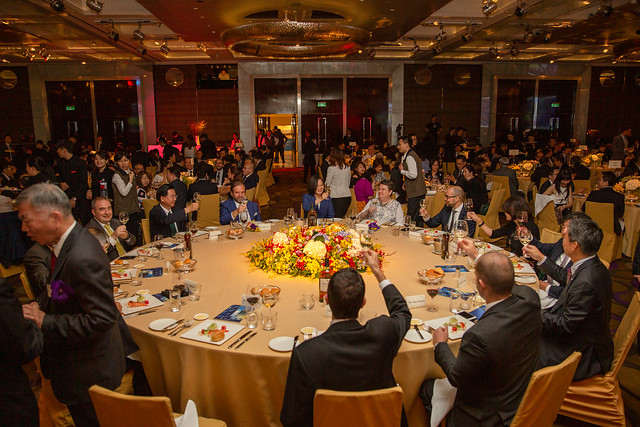News & activities
 News releases
News releases
On the evening of May 15, President Tsai Ing-wen attended the 2019 Europe Day Dinner. She thanked the European Chamber of Commerce Taiwan (ECCT) for its contributions in promoting Taiwan-EU relations, and said she looks forward to stronger ties and more shared successes.
A transcript of the president's remarks follows:
Good evening, everyone. I am delighted to be here with you all for the third year in a row. For tonight, I want to first thank ECCT Chairman Giuseppe Izzo and EETO (European Economic and Trade Office in Taiwan) Head Madeleine Majorenko for inviting me to speak here tonight. I thought that was one of the obligations of the president here. Both of you, alongside the ECCT and the EETO, are helping to foster closer ties between Taiwan and the EU.
I have heard that this will be Director Majorenko's last Europe Day Dinner with us, as she prepares to move on to her next post. I want to take this opportunity to congratulate Director Majorenko on her outstanding achievements in all regards. Madeleine, you have certainly brought Taiwan and EU much closer. I know that all of us in Taiwan will miss you, and we wish you all the best in Brussels.
I also want to congratulate the ECCT on this year's outstanding growth. For the first time since its founding in 1988, membership now totals more than 400 companies and organizations and over 900 individuals. That's why this room is rather crowded today.
So it's wonderful to see so many of these new faces in the crowd. The continued growth of the European business community in Taiwan is just another sign that trade and economic ties between Taiwan and the EU have never been stronger. And our ties go much deeper.
When Robert Schuman (French foreign minister between 1948 and 1952) began the Schuman Declaration with the following words, "World peace cannot be safeguarded without the making of creative efforts proportionate to the dangers which threaten it," he envisioned a union that went beyond economic interests, that would ensure democracy's continuity in Europe.
Today, nearly 70 years later, this sentiment is more relevant than ever.
Both Taiwan and the EU are bastions of democracy and freedom. As external forces and authoritarian governments pose a growing threat to our shared values, we must work together to come up with innovative ways to deal with these unprecedented challenges.
In February of this year, I received a gift from European Parliament-Taiwan Friendship Group Chair Dr. Werner Langen that exemplifies this united spirit. He presented me with a statement, cosigned by 155 members of the European Parliament, promoting peace and stability in the Taiwan Strait, and reiterating support for Taiwan's participation in international organizations.
As partners that share the same fundamental beliefs in freedom, democracy, and human rights, we are also grateful for the EU's strong support once again this year for our participation in the WHO and the WHA. Thank you.
The heads of Taiwan friendship groups in the European, French, German, and UK Parliaments cosigned a letter to the WHO Director General Tedros [Adhanom Ghebreyesus] calling for Taiwan's invitation to the upcoming WHA in Geneva. The president of the Italian Parliament's Taiwan Friendship Group wrote a letter supporting us as well. And parliamentarians from the Czech Republic, Estonia, Latvia, and Lithuania have sent their own letters in support of our WHA bid.
Although in the end we did not receive an invitation due to pressure from China, your move to speak up for the Taiwanese people and our right to health is heartening and appreciated.
The theme of this year's Europe Day is "Choosing Your Own Future." And in less than 10 days, European citizens will cast ballots to chart the future direction of the EU. You all also know that here in Taiwan, we are preparing to hold our own presidential election in January 2020.
I am happy to see Europe is actively taking steps to stop the flood of disinformation, and I believe that we can work more closely together to combat this threat.
It is our responsibility to ensure the people's right to choose their own futures, informed by the truth, and free from the influences of disinformation and subversion by authoritarian governments.
Because the Taiwanese people are absolutely clear on the future we choose: one where our rights, freedoms, and democratic way of life are fully protected.
As we all know, the forward march of democracy is not a given. But we are ready and willing to stand alongside likeminded partners such as the EU to safeguard democracy and the values we hold dear.
Our commitment to shared values brings us together. But tonight, I want to highlight our commercial ties, which are thriving, thanks to your hard work.
At last year's Europe Day Dinner, I said that my administration was committed to building on our cooperative momentum with the EU. And we delivered on this promise in a big way.
Our bilateral trade volume exceeded US$57 billion in 2018, bringing average annual growth over the past three years to 7%. EU investments in Taiwan also set a new record this year, reaching more than US$51 billion, marking a tremendous 51% jump over the past three years. So I think we should give ourselves a round of applause for that.
Much of this investment growth stems from Taiwan's rapidly expanding renewable energy sector. And it is my pleasure to report that we are making real progress on developing Taiwan's wind power industry. The process has not been easy, but this is one of my administration's major goals, and we are committed to seeing it through.
So I want to thank all of the companies here who are helping us realize our vision for a greener, more sustainable future. Thank you.
Yet I am confident that Taiwan and the EU can accomplish so much more together. We remain committed to pursuing a bilateral investment agreement (BIA) with the EU, and I trust that all of you agree that such an agreement would be beneficial for both sides.
In fact, a BIA would be perfectly in line with the theme of this year's dinner: Strengthening Ties for Future Success. Grounding our trade relationship in a solid legal framework would bring benefits for consumers, investors, and businesses both in Taiwan and the EU. So I hope to see concrete progress on this issue as soon as possible.
Speaking of success, it is time for some good news. First and foremost, we are making significant progress on the ECCT's 2018 Position Papers. We are actively addressing the 132 issues that you raised last year, a testament to how seriously we view your concerns and suggestions.
For example, we are spearheading an interdepartmental effort to make Taiwan a bilingual country by 2030. We have also resolved your concerns about foreign residents' ID number formatting, ensuring equal treatment for both citizens and foreign residents.
And you can rest assured that my administration will continue to work closely with you to facilitate investment, promote business, and improve the living and employment environment for foreign professionals in Taiwan.
We are continuing to work to relax regulations for foreign investment and hiring foreign professionals. Companies from all over the world are recognizing the results of our efforts, and firms such as WPD, Ørsted, Decathlon, and IKEA are increasing their investments and expanding operations in Taiwan.
But I was observing the introductions of the "gold" sponsors here for tonight's event. And I hope all the "gold" sponsors will be greater investors here this year, and next year, and in the future as well. So I will keep that list, and ask members of my government to visit you to make sure that your business interests here in Taiwan will grow.
But there's another piece of good news that is especially encouraging, that is to see dozens of Taiwanese firms making new investments back home. In fact, we have already reached our yearly goal of NT$250 billion in investments by Taiwanese firms, and it's only May! So we have raised the goal from NT$250 billion to NT$500 billion, and my Minister of Economic Affairs thought that it was quite an achievable goal.
Taiwan's economic climate has taken a positive turn. As you can all see, Taiwan's economy is resilient, and we are finding ways to thrive even in the face of global economic uncertainty.
I believe that the members of the EU know a thing or two about resilience as well. The EU is currently working hard to adapt and evolve to the ever-changing world around us. As stated in the Europe-Asia Connectivity Strategy last year, the core of the European vision for success in this new global age is connectivity.
And Taiwan is a natural partner for the EU in this respect. We already share strong synergies in transportation, energy, the digital economy, and people-to-people exchanges.
We have both walked down difficult paths in the pursuit of higher ideals: that is, the EU towards integration, and Taiwan towards democracy. We have shown the world time and again that the commitment to freedom, democracy, and human rights can surmount individual differences.
And if we continue to stand together, I believe we can accomplish much more good in the region and throughout the world.
So once again, I want to thank all of you here for your contributions to Taiwan-EU relations. In the coming year, I look forward to stronger ties, and more shared successes. Thank you all, and I hope you have a pleasant evening! Thank you.












